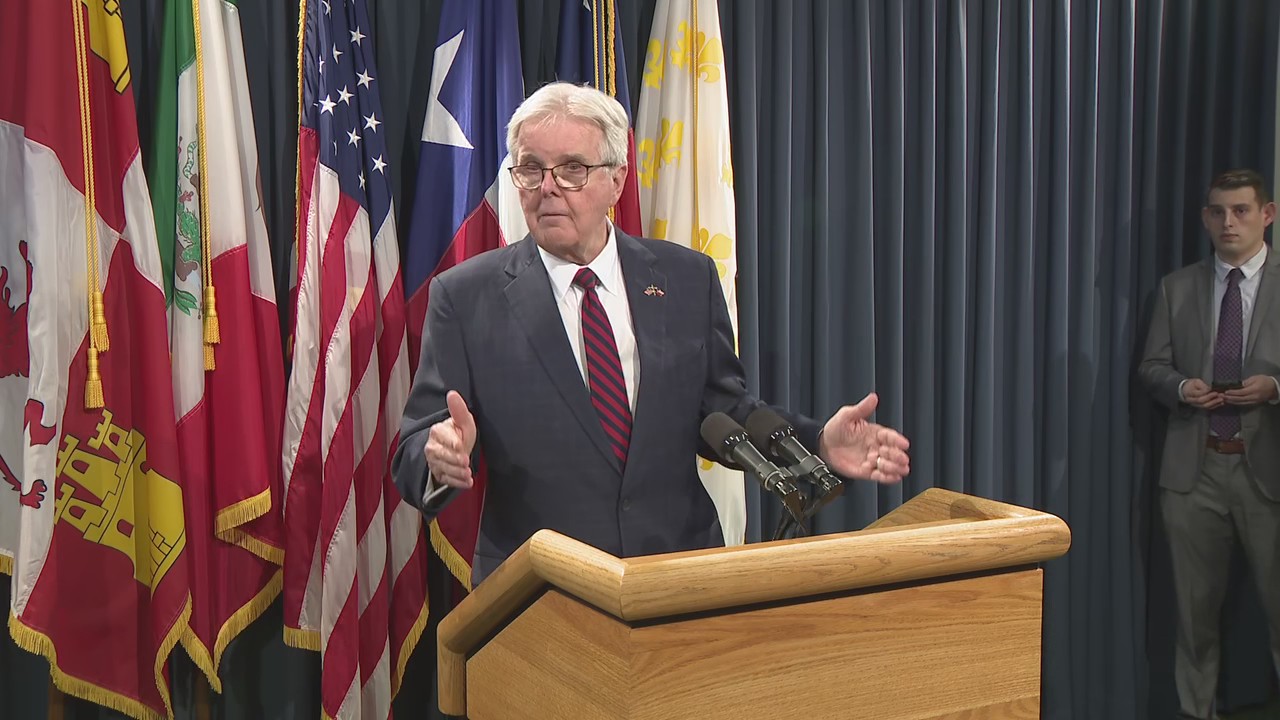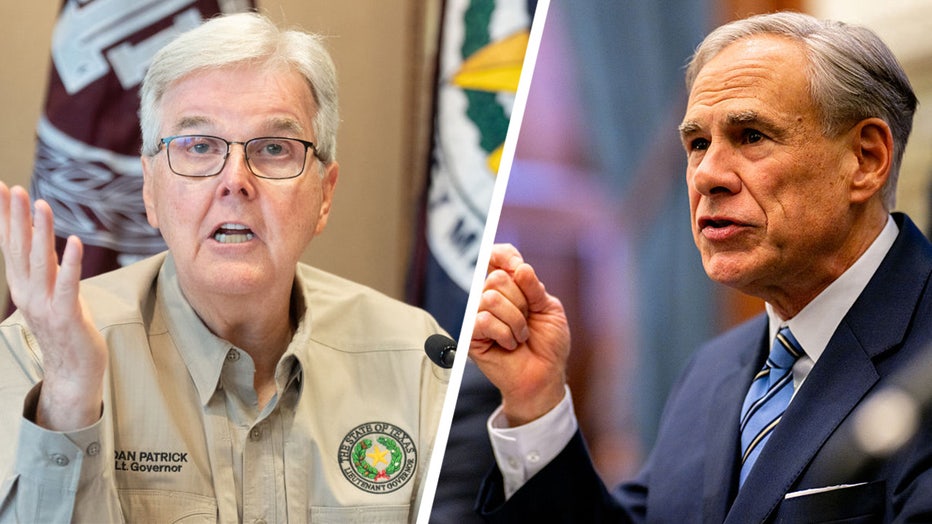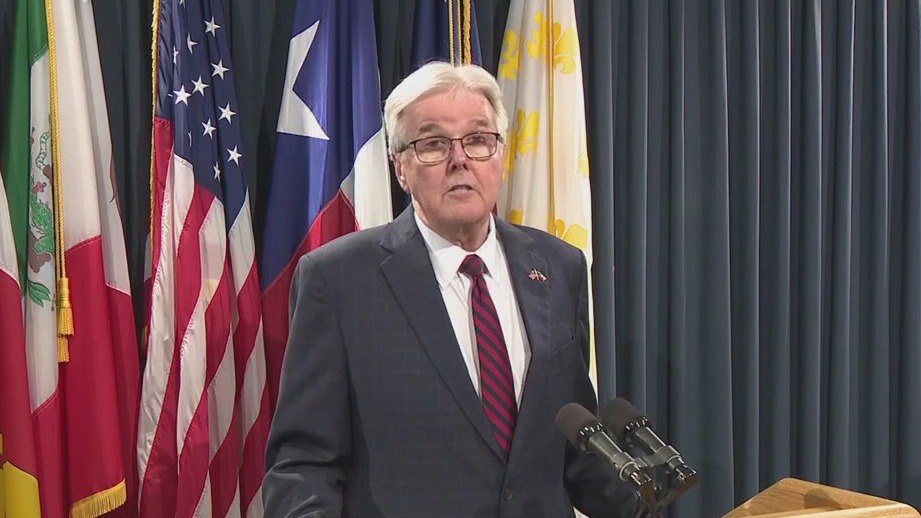Abbott vetoes Texas THC ban: Here's how Lt. Gov. Dan Patrick, others reacted

FULL: Texas Lt. Gov. Dan Patrick on SB 3 veto
Texas Lt. Gov. Dan Patrick speaks after Gov. Greg Abbott announced he had vetoed Senate Bill 3, which would have banned THC products in the state of Texas. Abbott is instead calling for regulations instead of an outright ban. Patrick has been a strong supporter of SB 3.
AUSTIN - Governor Greg Abbott's last-minute decision to strike down a sweeping prohibition on consumable THC products has ignited strong disapproval from Lt. Gov. Dan Patrick, even as it drew praise from the state's hemp industry.
The action, taken just moments before the veto deadline Sunday, ensures the continued operation of Texas' rapidly expanding hemp market and sets the stage for a contentious upcoming special legislative session.
Lt. Governor Dan Patrick Condemns Decision

(Photo of Dan Patrick by Jason Fochtman/Houston Chronicle via Getty Images), (Photo of Greg Abbott by Brandon Bell/Getty Images)
What they're saying:
Patrick, a vocal advocate for the ban who has publicly described THC-infused items as a "poison in our communities," swiftly condemned the governor's move. In comments made on social media late Sunday, he criticized Abbott for maintaining "total silence" on Senate Bill 3 throughout the legislative session. Patrick suggested the veto would leave both law enforcement officials and families impacted by high-potency products feeling "deserted."
"This late-night veto, despite overwhelming support from legislative Republicans, law enforcement, and medical and educational professionals, as well as families who have witnessed the devastation caused by these potent substances, will leave many feeling abandoned," Patrick stated. "My deepest sympathies go out to those who testified and shared their painful experiences. I plan to elaborate further at a press conference tomorrow in Austin."
The veto directly undermines one of Patrick's top legislative priorities during his nearly two decades in the Legislature. He actively championed the ban, visiting cannabis retailers and producing investigative-style content to highlight what he characterized as dangerous business practices.

PREVIOUS COVERAGE:Lt. Gov. Dan Patrick on THC ban in Texas: FULL
Texas Lieutenant Governor Dan Patrick holds a news conference about banning of THC in the state of Texas. Senate Bill 3 is awaiting approval from Gov. Greg Abbott.
At a news conference on Monday, Patrick slammed Abbott's last-minute decision.
"One can only come to this conclusion, which surprises me, the governor of the state of Texas wants to legalize recreational marijuana in Texas," Patrick said.
Patrick argued against points brought up by the governor in his veto proclamation, including concerns about lawsuits.
"Since when did we care who sued us when we passed a bill?" the lieutenant governor said. "I'm sure if they haven't already, they're going to sue us on school choice and the 10 Commandments [displayed in schools]. And they're going to file a [lawsuit] on the prayer bill. We deal with lawsuits all the time. So that shouldn't be a surprise."
Patrick also said he was confused because he claims the governor had told him not to worry about the approval of SB3. The lieutenant governor said he did not get a call from the governor before the decision.
"The last time I talked to the governor in the Capitol before session, he said, don't worry about the bill. He said, ‘your bill is fine.’ That's what he told me in front of witnesses. In fact, he asked a couple of lawyers of my staff. He said, ‘can you give me some answers I can give? Because when I sign this, I need some answers to give.' So what happened?" Patrick said.
The lieutenant governor says that allowing THC products in the state could have a large impact.
"Who are we as a state? We think we're going to attract business here if we've got a bunch of people high on marijuana at very high levels? Is that who wants to come here and build their plant here, open up a business, move their family here? We're not Colorado, and we're not Oregon, and we are not Washington state. We're Texas," Patrick said.
The lieutenant governor said he's not mad at Gov. Abbott.
"I'm not mad at governor, but I'm not going to legalize marijuana in Texas. And if people want to vote me out of office for that, so be it. Not gonna do it," Patrick said.
Gov. Abbott's office responds

Dan Patrick reacts to veto of SB 3
Texas Lt. Gov. Dan Patrick accused Gov. Abbott of wanting to legalize recreational marijuana. Late Sunday night, Gov. Abbott vetoed SB 3, which would have banned the sale of most consumable hemp products
The possibility of not surviving a court challenge was cited by Governor Abbott for issuing his veto. In a statement, the Governor's spokesperson, Andrew Mahaleris did not respond to Patrick’s "pro-legalization" accusation.
"Governor Abbott has always shared the Lieutenant Governor's desire to ensure that THC products are not sold to our children and that the dangerous synthetic drugs that we have seen recently are banned. SB 3 was well intentioned but legally flawed, and this is why he is putting it on the special session agenda so that it can be fixed, improved, and signed into law. We should not risk years of potential legal battles when we can fix the bill and protect kids now. Governor Abbott looks forward to working with the legislature to pass a strong bill that is on sound legal footing."
Hemp Industry Supports Veto
The other side:
Conversely, the Texas Hemp Business Council, which had vigorously lobbied the governor to reject the bill, celebrated the decision as a triumph for both the industry and Texas consumers.
"Governor Greg Abbott's veto of SB 3 reaffirms Texas' standing as a leader in business innovation and pragmatic governance," the council posted online. "By opting for a balanced approach over overreach, Governor Abbott has safeguarded a flourishing, federally recognized hemp industry that provides employment for 53,000 Texans and contributes over $4.3 billion in annual sales."
The council contended that an outright prohibition would have "driven consumers towards unsafe alternatives and jeopardized public health and choice." They said existing regulations, established under House Bill 1325, already impose strict limits on THC content, require comprehensive testing, mandate licensing, and govern labeling. The council also reiterated its support for "sensible additions" such as restricting sales to individuals 21 and older, mandating child-resistant packaging, and implementing distance requirements from schools—provisions they noted were rejected by those pushing for SB 3.
"Consistent polling indicates that Texans do not favor a ban on hemp-derived products," the council said, commending Abbott for "heeding the voices of over 150,000 petition signers and thousands more who shared their personal stories."
Hemp industry advocates like Cynthia Cabrera, with Hometown Hero, pushed back on Patrick’s comments.
"Regardless of what Lt. Dan says Texas has had regulations on hemp since 2019. So, the idea that the space is wholly unregulated is untrue," said Cabrera.
Representatives for the hemp industry, before the Regular Sesson started earlier this year, admitted some providers went too far. On Monday, hemp beverage maker Jake Bullock issued a statement to FOX 7.
"Governor Abbott’s veto of SB3 is a huge win for common sense, small business owners, and Texans who deserve access to safe, regulated hemp products. This shows real leadership, pushing back on panic-driven narratives and acknowledging what’s actually working in the real world. "Texans want choices, not bans. Responsible hemp companies like Cann have been advocating for real regulations all along: age restrictions, dosage caps, testing requirements, and clear limits on marketing. Now, we have an opportunity to do it right during the special session."
Drafting a new regulation bill should not be a difficult process, according to Cabrera.
"We're not talking about plutonium here. We're talking about a consumable product that is far less dangerous than alcohol or tobacco. So, I don't see why it should be treated anymore stringently than alcohol or tobacco," said Cabrera.
Other Reactions
Special Legislative Session Called
Big picture view:
Abbott, in his explanation for the veto, said Senate Bill 3 would likely face "unsuccessful constitutional challenges" and create a "conflict between federal and state law," given the 2018 federal Farm Bill's legalization of hemp products. He instead called for a special legislative session for July 21, to establish a "regulatory framework that ensures public safety, complies with federal law, includes robust enforcement mechanisms, and can be implemented without delay."
This proposed regulatory approach, similar to how alcohol is overseen, includes suggestions such as prohibiting sales and marketing to minors, requiring product testing, allowing local jurisdictions to ban sales locations, and increasing funding for law enforcement.
The contentious debate over Senate Bill 3 underscores the growing divergence in Texas regarding the rapidly expanding hemp industry. This sector, which has seen explosive growth since 2019, now supports an estimated 50,000 jobs and generates $8 billion in annual tax revenue.
While Patrick and his allies argue a ban is essential to shield young people from high-potency THC products, the hemp industry, alongside veterans and other individuals who utilize consumable hemp for chronic pain management, advocates for comprehensive regulation over an outright prohibition.
What's next:
Abbott has called for a special session to begin on Monday, July 21 with an initial list of agenda items:
- Senate Bill 3: Relating to the regulation of products derived from hemp, including consumable hemp products and the hemp-derived cannabinoids contained in those products
- Senate Bill 648: Relating to recording requirements for certain instruments concerning real property
- Senate Bill 1278: Relating to an affirmative defense to prosecution for victims of trafficking of persons or compelling prostitution
- Senate Bill 1758: Relating to the operation of a cement kiln and the production of aggregates near a semiconductor wafer manufacturing facility
- Senate Bill 2878: Relating to the operation and administration of and practices and procedures related to proceedings in the judicial branch of state government
Other vetoes by Abbott
Dig deeper:
Abbott says he signed 1,155 bills into law and vetoed only 26 from the recent legislative session.
Those vetoed include:
- House Bill 305: Relating to the time period for conducting pretrial hearings after a criminal defendant has been restored to competency
- House Bill 353: Relating to creating the criminal offense of trespass on or near school or day-care center property
- House Bill 413: Relating to the release of certain defendants detained in jail pending trial
- House Bill 449: Relating to the unlawful production or distribution of sexually explicit media using deep fake technology
- House Bill 705: Relating to the Cosmetology Licensure Compact; authorizing fees
- House Bill 1690: Relating to an application for a permit for the transfer of groundwater out of a groundwater conservation district
- House Bill 2243: Relating to the creation of the Texas Commission on Teacher Job Satisfaction and Retention
- House Bill 2520: Relating to the open meetings law
- House Bill 3120: Relating to certain duties of the owner or operator of a residential child detention facility
- House Bill 4530: Relating to water rights placed in the Texas Water Trust and the Texas Water Bank
- House Bill 4885: Relating to the disclosure of confidential juvenile records to a managed assigned counsel program
- House Bill 5671: Relating to the election of directors for and the authority to issue bonds of the Johnson County Special Utility District
- Senate Bill 3: Relating to the regulation of products derived from hemp, including consumable hemp products and the hemp-derived cannabinoids contained in those products
- Senate Bill 268: Relating to the procedure for certain complaints against health care practitioners
- Senate Bill 378: Relating to certain prohibited practices by a barber or cosmetologist
- Senate Bill 614: Relating to the authority of the Texas Forensic Science Commission to review and refer certain cases to the office of capital and forensic writs
- Senate Bill 648: Relating to recording requirements for certain instruments concerning real property
- Senate Bill 974: Relating to the eligibility of a person employed by a school district as a teacher to serve on the appraisal review board of an appraisal district; creating a criminal offense
- Senate Bill 1032: Relating to the eligibility of postsecondary educational institutions to participate in the governor's university research initiative
- Senate Bill 1253: Relating to impact and production fees for certain water projects and to the regulation of certain wells; authorizing a fee
- Senate Bill 1278: Relating to an affirmative defense to prosecution for victims of trafficking of persons or compelling prostitution
- Senate Bill 1838: Relating to the appointment of attorneys ad litem and the compensation of certain attorneys ad litem in suits affecting the parent-child relationship filed by a governmental entity
- Senate Bill 1937: Relating to the testing of evidence containing biological materials in capital cases
- Senate Bill 2111: Relating to legal representation of indigent persons in this state and to proceedings before a magistrate including the appointment of counsel for an indigent defendant
- Senate Bill 2501: Relating to selection of an attorney by an indigent parent as attorney ad litem for the parent in certain suits affecting the parent-child relationship
- Senate Bill: 2878: Relating to the operation and administration of and practices and procedures related to proceedings in the judicial branch of state government, including court security, court documents and arrest warrants, document delivery, juvenile boards, constitutional amendment election challenges, mandatory expunction for certain persons, record retention, and youth diversion; increasing a criminal penalty; authorizing fees
Read Abbott's veto proclamations here.
The Source: Information in this article is from Texas Governor Greg Abbott, from Lt. Governor Dan Patrick's social media, and a statement from the Texas Hemp Business Council.

